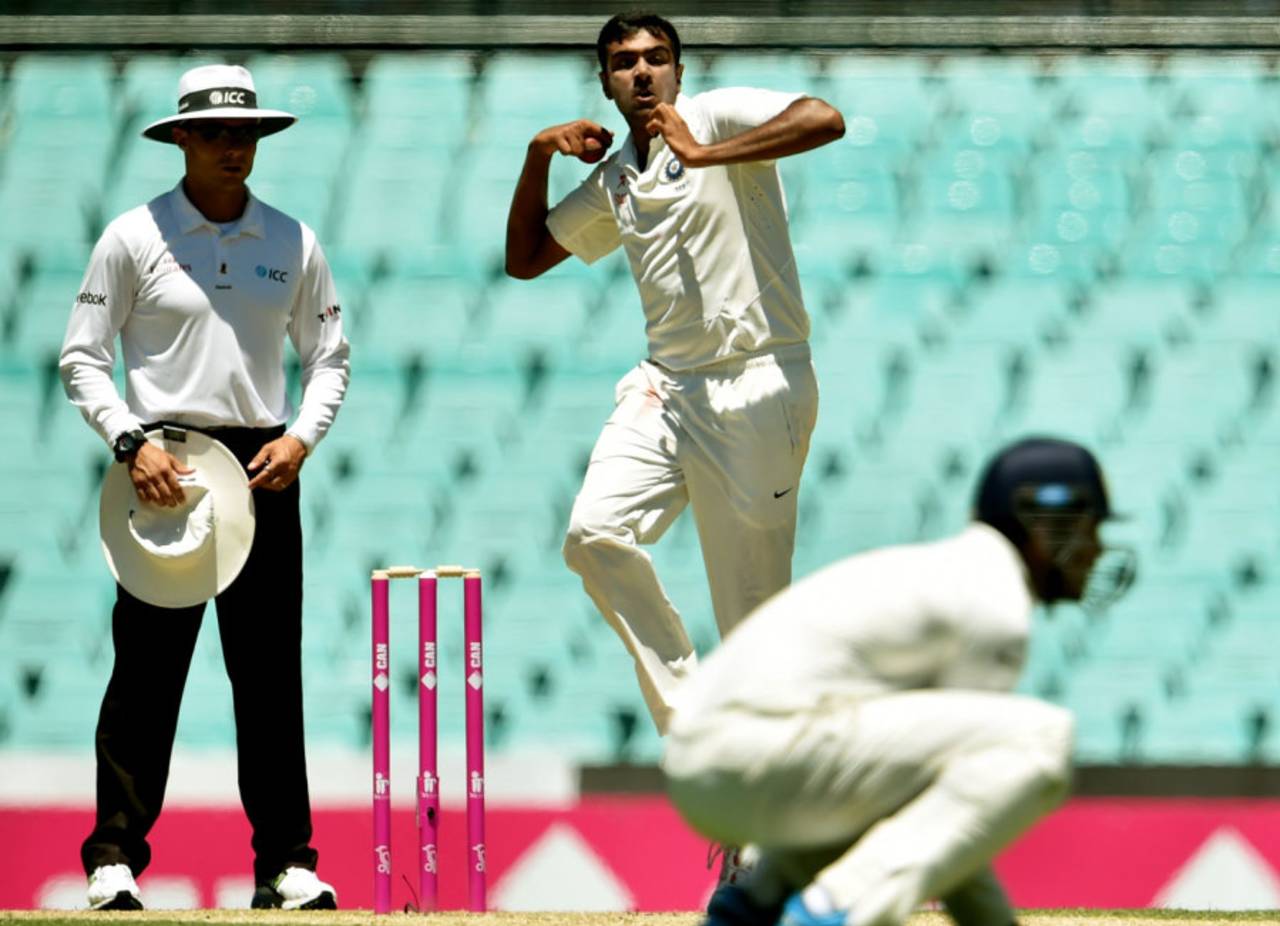India players uneasy about 'umpire's call'
R Ashwin and a few other India players have expressed objections against the 'umpire's call' aspect of the DRS
Sidharth Monga in Mohali
Nov 3, 2015, 8:44 AM

'If you have already judged it not out, the odds of it being not out are 99%. Is DRS umpire protective or player protective?' - Ashwin • AFP
The 'umpire's call' is R Ashwin's big objection against DRS, but when asked if that was also the team and the team management's view, he didn't offer a comment. In an interview with ESPNcricinfo before the start of India's home season, Ashwin said he was happy to go with the team's decision, but didn't mind a DRS minus the predictive element either. Other players that ESPNcricinfo spoke to are not entirely averse to the idea of DRS but point to the possibility of manipulation of technology by host broadcasters, who pay for the DRS as the system stands now. However, they said they didn't know why the team leadership didn't accept DRS.
This series between India and South Africa will be yet another without DRS, while other series around the world continue to use technology to correct or vindicate umpires' decisions. India's refusal to adopt DRS even though their limited-overs captain and manager criticise umpires publicly has been matter of debate and intrigue because officially they have never gone beyond the stock phrase: "DRS is not 100%."
Ashwin is perhaps the first of the India players to present some solid views about DRS on the record. "Personally speaking, I don't agree with the concept of umpire's call," Ashwin told ESPNcricinfo. "If I have two reviews, and I take one of them, and you have already judged it not out, the odds of it being not out are 99%. Is DRS umpire protective or player protective?"
When suggested that if the replays return an umpire's call, it means the original decision wasn't a really bad one, Ashwin raised a more important point. "Cricketers are not rocket scientists," he said. "Let's keep it that simple. Do you think in 15 seconds the captain standing at mid-off will be able to say it is not umpire's call? If you want to make the game a better place, either trust the technology completely or don't."
Another player hinted at a deeper mistrust of the umpires when it came to the umpire's call. "I don't get this umpire's call," he told ESPNcricinfo in Australia, after India had been at the receiving end of a few rough ones in Adelaide. "They will invariably go against us. If you want to use technology, you have to take it out of the hands of the humans."

'If you want to make the game a better place, either trust the technology completely or don't' - Ashwin•AFP
This is consistent with India's general belief - which they don't express publicly - that umpires are biased against them when it comes to subjective calls. In Australia, one senior player felt the umpires were scrutinising no-balls by Indian bowlers more than the Australians. ESPNcricinfo hasn't been able to verify this independently, but the player said quite a few no-balls by Australian bowlers went unnoticed.
There has been a deep-seated mistrust - almost siege - for the DRS because it is eventually used by the same umpires. A player said he was led to believe the host broadcaster could manipulate the pictures and the technology to influence decisions. However, none of the players could speak on behalf of the leadership as to what the real reason for aversion to DRS was. ESPNcricinfo asked the player who suspected manipulations and lack of clarity if those were the reasons he was opposed to DRS. His response was, "I didn't say I am opposed to it."
Ashwin said he was happy with a DRS that didn't involve projections. A system that revisits only events that have happened and not predict what would have happened, which is where the umpire's call mostly comes in. Just look at where the ball pitched, where it hit the batsman, and whether it hit the bat before hitting the pad, don't use the predictive path. "That should be perfect," Ashwin said. However, there is a problem even in that system: it will help the batsman more. It can only be used when a batsman has been ruled out. When the original decision is not out, you never know why the on-field umpire ruled him not out, and can still stick with the original call to save his decision even if the replays of what happened fulfil all the criteria for an lbw.
When Ashwin was asked if the team discussed DRS after the gutting loss in Galle, he said: "Not been too many discussions on those lines. Maybe these Test matches could trigger the fact that we might look at DRS. You never know."
Sidharth Monga is an assistant editor at ESPNcricinfo